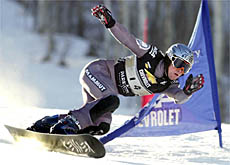Triathlete battles to take part in Olympics

After winning the bronze medal in the triathlon at the 2000 Olympic Games in Sydney, Magali Di Marco Messmer decided to retire from the sport.
But her comeback after a three-year break and maternity leave is being hindered by an anti-doping rule.
Di Marco Messmer returned to the triathlon six months ago and since then has been training hard for this year’s Olympic Games in Athens.
But the triathlete may be prevented from competing at the Olympics and even on home soil due to Swiss Olympic Association regulations.
Article five, paragraph two of the statute on doping stipulates: “Those who have been suspended or have taken a break and wish to compete again, must be able to prove that, beforehand, they have been in the anti-doping testing system for at least one year.”
The news came as a shock to Di Marco Messmer, who has resorted to a lawyer – and the media – to help fight against the rule.
swissinfo met the athlete at her flat in the alpine village of Château d’Oex in canton Vaud, just before she left for two weeks of training in Cyprus.
swissinfo: How are you feeling at the moment?
Magali Di Marco Messmer: Now that I have returned to the sport, I find I’m not allowed to carry out my profession. It’s very hard to not to be discouraged and to keep training in these conditions.
Instead of being able to concentrate one hundred per cent on my preparation, I spend most of my time struggling with legal questions and replying to media enquiries.
In fact, I have just as many problems as an athlete who has been punished for doping offences. The fight against this scourge [of the sporting world] is not yet perfect and I am the living proof of this. It’s an injustice and I have to fight it.
swissinfo: Why did you choose to make your fight public?
M.D.M.M: Actually I didn’t choose to at all. When I announced my comeback at a press conference on January 18, the Swiss Triathlon Federation and the Swiss Olympic Association had already known for several months about my plans. But nobody ever contacted me about taking anti-doping tests.
On January 21, the Swiss Olympic Association anti-doping commission told the Swiss Triathlon Federation about the ruling and they told me the next day. The Federation immediately sent out a press release which included the famous article five. Since then it’s been impossible to talk about it in a calm manner. I would have much preferred to have started by discussing it in private. That’s also why I decided to hire a lawyer.
swissinfo: Do you regret your decision to end your career after Sydney?
M.D.M.M: Not at all! I had already decided to do it well before the Olympics. I had fulfilled my dream. I didn’t feel burnt out. But I wanted to do other things, to find a sense of equilibrium outside sport while I was still young.
swissinfo: Was your comeback due to the fact that you missed the sport or that you didn’t find the stability you were looking for in your other life?
M.D.M.M: It’s a paradox. High-level sport does not give your life balance in itself, you have to have that in your genes. I’ve always had the desire and the need to be an athlete.
The working world didn’t give me what I had hoped for. I’m sure that there are still many more experiences I can have through the sport. I’m giving myself four years, until the Olympic Games in Beijing.
swissinfo: You have said that if you fail in your bid, you might consider representing another country. Is this a threat made in a fit of pique?
M.D.M.M: There’s no question of that yet. But three years ago, just after I got my medal, the Swiss president congratulated me for “services” to the country and now I’m not even allowed to compete!
Of course, I’d like to find a solution in Switzerland, but I’m not excluding anything. I’d like to be able to do the triathlon without anyone putting obstacles in my way.
Let’s be clear here: even if my trainer is Italian, my husband bi-national and a few sponsors from this country have supported me in the past, I haven’t as yet received a concrete offer from Italy. In any case, it would be a very personal decision and in no way intended to exert pressure, because this would probably not have any influence on the attitude of those in charge of sport in Switzerland.
swissinfo: Is it difficult to be a professional sportsman or woman in Switzerland?
M.D.M.S: Yes, very much so. And even more if you are successful. People don’t like others being more successful than them in Switzerland. Furthermore, the Swiss constitution forbids Switzerland from helping competitive sports, which is a shame. This should change.
swissinfo-interview: Mathias Froidevaux in Château d’Oex
The triathlon comprises 1.5km swimming, 40km cycling and 10km running.
Di Marco Messmer dominated the Swiss triathlon scene for six years, being crowned Swiss champion four times.
Her international career peaked in 2000 after she won the bronze medal in Sydney.
After three years off and maternity leave, the Neuchâtel-born athlete decided to make her comeback.
But article five of the anti-doping regulations of the Swiss Olympic Association is blocking her return to competition.

In compliance with the JTI standards
More: SWI swissinfo.ch certified by the Journalism Trust Initiative









You can find an overview of ongoing debates with our journalists here . Please join us!
If you want to start a conversation about a topic raised in this article or want to report factual errors, email us at english@swissinfo.ch.